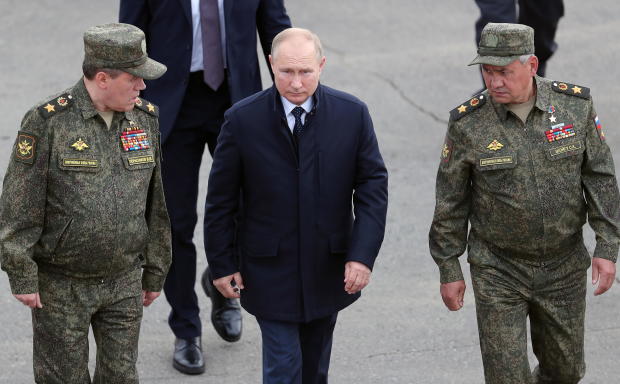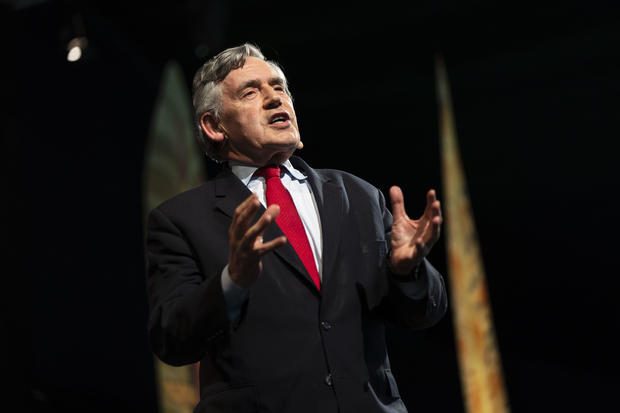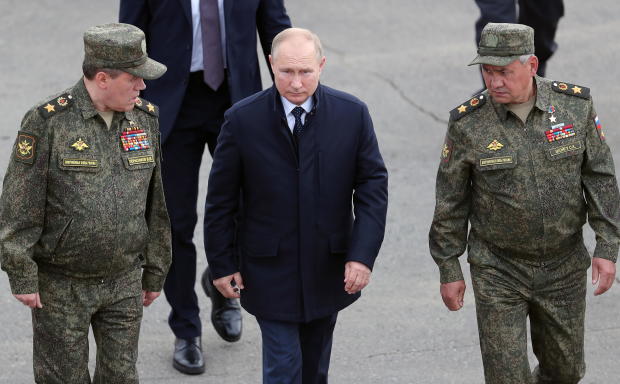London — As prosecutors gather evidence of thousands of war crimes allegedly committed by Russian troops in Ukraine, a number of prominent figures have joined the Ukrainian government to call for a new Nuremberg-style tribunal to hold Russia’s leaders to account for one specific crime they say is falling through the cracks: the crime of aggression.
- What are war crimes and is Russia committing them in Ukraine?
Ukraine is working with various international bodies to prosecute war crimes, and it’s already charging people within its own criminal justice system. But prosecution for the crime of aggression, advocates for a special tribunal say, may be the best way to see Russian President Vladimir Putin himself face justice for the war.
“When bombs fall on your cities, when soldiers rape women in the occupied cities… it’s difficult, of course, to speak about the efficiency of international law,” Ukrainian Foreign Minister Dymtro Kuleba said when the call for a tribunal was first announced in March. “But this is the only tool of civilization that is available to us to make sure that, in the end, eventually, all those who made this war possible will be brought to justice.”
What is the crime of aggression?
Since 1945, there have been four types of defined international crime: war crimes, crimes against humanity, genocide, and the crime of aggression. The last, articulated under the International Criminal Court’s founding Rome Statute, is defined as “waging a manifestly illegal war,” professor and international law expert Philippe Sands told CBS News.
Aggression “is a leadership crime,” Sands explained. “It is only committed by those who have the power, the capacity to decide to wage or continue a manifestly illegal war. What that means in the context of Ukraine; you’re talking about Mr. Putin, Mr. Lavrov [Russian Foreign Minister], the Minister of Defense, the top military officials, the top intelligence people.”

Sputnik/Sergei Savostyanov/Pool via REUTERS
But prosecuting Russia for the crime of aggression over the war in Ukraine is no straightforward task under the current international justice system.
In the specific case of Russia’s invasion of Ukraine — barring an extremely unlikely referral from the United Nations Security Council, where Russia has veto power — the International Criminal Court does not have jurisdiction over aggression.
“There is a gap in the international legal order,” Sands said. “The crime exists in international law, but there’s no way to enforce it.”
Why does the crime of aggression matter?
With the other war crimes or crimes against humanity allegedly committed by Russian troops in Ukraine, it may be difficult or even impossible to establish a direct connection to Russia’s leaders.
“I think it’s possible that you can find evidence that links Putin directly to war crimes, crimes against humanity, but there’s absolutely no doubt that Putin is guilty of this initial crime — what the Nuremberg trial authors called the ‘initial and fundamental and supreme crime’ — the crime of actually planning an aggression against a sovereign state,” former British Prime Minister Gordon Brown, who’s backing the establishment of a tribunal for Ukraine, told CBS News.
“The only thing [Putin] will understand is if there is a strong response from the West, and part of the strong response is to tell him that he cannot escape with impunity for crimes that he himself has committed and is responsible for directing,” Brown said.
Mykola Gnatovsky, a law professor and advisor to Ukraine’s foreign minister, agrees that a strong international response to Russia’s actions is necessary to show that invading a sovereign state without justification is unacceptable.
“We are dealing with current dramatic, tragic situation, to a significant degree, because in 2014, when Russia attacked Ukraine and seized parts of its territory, the international community has not been able to provide a strong response which would be strong enough to deter any further action by the aggressor, to hold the aggressor to account,” Gnatovsky said when the initiative to create a tribunal was announced in March.
Limited support for a tribunal
Some major geopolitical powerhouses, including the United States, have yet to explicitly back the call for a special international tribunal to try Russia for the crime of aggression.
“They’re worried that if you create a special tribunal for one permanent member of the Security Council today, then tomorrow another could be created in relation to some allegation of a British crime or a French crime or an American crime,” Sands told CBS News. “There is an elephant in the room here, and that, of course, is Iraq.”
Brown, who was Britain’s leader at the end of the U.K. involvement in the Iraq war, said any special tribunal would not be retrospective.

David Levenson/Getty
“The crime of aggression is one that has only been added to the International Criminal Court’s statutes in the last few years,” Brown said. “So we’re talking not retrospectively, we’re talking about action taken on the basis of decisions that have been made by the international community very recently.”
“The United States has been a leader, historically, on the international stage with respect to accountability for the most serious crimes and, of course, the United States was one of the countries that formed the Nuremberg Tribunal after the Second World War,” James Goldston, the executive director of the Open Society Justice Initiative, told CBS News. “That being said, it is no surprise that major powers including the United States may look with some trepidation at prosecutions for the crime of aggression, given their own historical activities, and given their own desire to preserve freedom of action going forward.”
The Open Society Justice Initiative has published a model indictment that could be used to try Russia’s leaders for the crime of aggression.
“If Putin is not prosecuted for aggression, I want the historical record to reflect that the legal case against him was clear, and that the failure was purely political,” said Rebecca Hamilton, an associate professor of law at American University in Washington D.C., who co-authored an early version of a model indictment.
“What Putin has done and is continuing to do against the Ukrainian people is criminal,” said Hamilton. “It is as criminal today as it was when he launched this war back in February. And while the rest of the world is start[ing] to get distracted by other issues, the Ukrainian people do not have the luxury of ‘moving on.'”
Haley Ott
Haley Ott is a digital reporter/producer for CBS News based in London.
